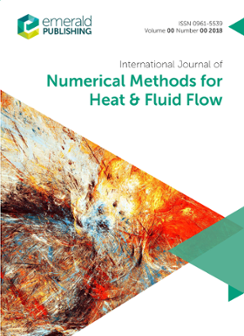International Journal of Numerical Methods for Heat & Fluid Flow: Volume 11 Issue 4
Table of contents
Accurate and efficient solutions of unsteady viscous flows
P. De Palma, G. Pascazio, M. NapolitanoThis paper describes two accurate and efficient numerical methods for computing unsteady viscous flows. The first one solves the incompressible Navier‐Stokes equations in their…
A comparative study on the performance of two time stepping schemes for convection in a fluid saturated porous medium
P. NithiarasuA comparative study has been carried out to investigate the performance of two different time stepping schemes for convective heat transfer and flow in a fluid saturated porous…
Numerical study of natural convective heat transfer with large temperature differences
Jan Vierendeels, Bart Merci, Erik DickSteady‐state two‐dimensional solutions to the full compressible Navier‐Stokes equations are computed for laminar convective motion of a gas in a square cavity with large…
Numerical natural convection in a sector‐shaped enclosure
Joseph Sarr, Mactar Sall, Mamadou Mansour Kane, Bassirou Ba, Michel DaguenetThe purpose of this paper is to compare the numerical laminar two‐dimensional unsteady natural convection in a partial sector‐shaped enclosure submitted respectively to a constant…
Spectral trisection of finite element models
A. Kaveh, H.A. Rahimi BondarabadyIn this paper a new method is proposed for finite element domain decomposition. A weighted incidence graph is first constructed for the finite element model. A spectral…
Boundary integral formulation and mushy zone model for phase change problem
S.G. AhmedIn the present paper, a simple mushy zone model and the boundary integral technique are applied to solve a phase change moving boundary problem. Owing to the use of the mushy zone…

ISSN:
0961-5539Online date, start – end:
1991Copyright Holder:
Emerald Publishing LimitedOpen Access:
hybridEditor:
- Prof Roland Lewis